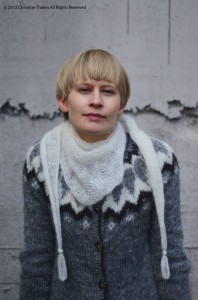We Talk with Norwegian Musician Jenny Hval
 Recently, while attending the Iceland Airwaves festival in Reykjavik, I caught up with Norwegian musician Jenny Hval, an artist performing at Airwaves (and in Iceland) for the first time. Amidst the chaos and jetlag, I had one of the most interesting and thought-provoking conversations. The written word doesn’t do justice to her delicate delivery of such sound musings on the art of music and performance. She is slated to visit the U.S. to perform sometime this year. Her intimate, ever-changing performances are not to be missed.
Recently, while attending the Iceland Airwaves festival in Reykjavik, I caught up with Norwegian musician Jenny Hval, an artist performing at Airwaves (and in Iceland) for the first time. Amidst the chaos and jetlag, I had one of the most interesting and thought-provoking conversations. The written word doesn’t do justice to her delicate delivery of such sound musings on the art of music and performance. She is slated to visit the U.S. to perform sometime this year. Her intimate, ever-changing performances are not to be missed.
Can you describe the (music) scene in Oslo at the moment?
Well, Oslo has several connected but also very distinct music scenes. In other small towns (of Norway), it’s more about everybody coming together. Oslo is a little bit separate. I think it’s great because a lot of stuff happens there. Unfortunately, you’ll never get to see the full spectrum or the bands that I really love (at Airwaves). I mean, there are a few Norwegian bands here, but there are so many other great ones. Some undercurrents of the underground scene can only be understood at a certain moment in time, so there will always be those slipping through, those the more mainstream scene doesn’t understand yet.
At the moment, there are a lot of bands coming out of jazz education, but they don’t play jazz. It’s a kind of pop music, influenced by this and that, but at the very center of it, there’s a kind of freedom. It’s not so much about the style of music they’re playing; it’s more about the free approach. There’s a lot of new stuff happening, which is really great. There’s been very interesting music over the last ten years or so in Norway, but now I think something really, really good is happening.
Where does your music fit into all of this?
It would be easier for other people to explain where it fits in. I have a different background. I didn’t play with Norwegians early on because I lived in Australia from 2000 to 2004, so I didn’t start playing in Oslo until I was about 24 or 25, and I always played by myself. I didn’t really get that crowd. I think my music is a bit of outsider music, but I also think that you would see parallels to this and that if you weren’t me. If you asked any of the other Norwegians whether they’ve heard of my music and where I would fit in, maybe they would say something else that would also be right.
Can you explain how you go about creating the lyricism of your songs? It seems there is such a strong and deeply personal performative element to the lyrics?
I think I improvise a lot, which means that other things come out than when I plan things. I write lyrics by recording my voice, so it’s somewhere in between stream of consciousness and hearing my own voice at the center of it. Hearing my voice means also hearing a lot of other voices that are in my head at the same time. I think for the album that I released earlier in 2011, it was pretty much lyrics first. I seem to remember that lyrics were written very much for music but not for songs, so they were written for space and certain pronunciations. The music had to follow a rhythm that was more based on a speaking style, a more spontaneous style. I think that’s probably the thing that makes me think of music as different than other musicians and bands since most people write the music or the form first. They think of the music form – the verse, the structure, the shape with rhyme. There’s something happening before the words. When I write, it’s more unconscious. I rarely think of a type of song when I write lyrics. I think the structures that I end up with are somewhat different from what most Norwegian bands would. It’s also because I’m so interested in the English language. A lot of Norwegian bands don’t focus on lyrics so much; they create cinematic or visual imagery or instrumental music. I have listened to a lot of improvisation and a lot of experimental music, which has kind of made it easier for me to work with these lyrics. I’ve let go of having to have certain structures.
What different reactions have you gotten?
People are different, concerts are different, and the songs are different every time they’re played. I make each song into something else. A big space will make everything church-like, and I’ll find new qualities in the music that weren’t there when we are playing in a small basement.
What’s your musical background?
I played the clarinet growing up. I never learned how to play the piano, but I got a keyboard when I was around six, and I started playing with headphones. I guess I didn’t think of it as composition, but that’s probably what I was doing. I just picked up and played. Sometimes I would play a classical-sounding piece that I’d heard on the radio, but sometimes it would be a synth pad. I learned to play the guitar later, as I had never been very interested in guitar solos and different scales. I stopped playing (the guitar) when I was 19, when I moved to Australia, but then I started playing again around two years later… and that was when I realized that it was fun to play and I wanted to play music. But I still didn’t really find it that interesting until I bought a 3-track recorder. After I got that, I just made music all the time, and I was studying creative arts in Melbourne, and so I would always make songs and pieces that had to do with what I was writing or doing at university, so it would be a parallel free study. Music was my friend because I was living in a foreign country. I had a lot of friends there, but I didn’t have the security of having family or old friends and relatives close by…so music became that for me for a time.
Do you also collaborate with other musicians?
Yes, I do that more and more now. I used to play in bands in Australia and collaborate on other projects like theater and dance. I kept doing that when I went back to Norway in 2004. My project has always been a solo project, but I’m involving my band more and more in the arrangements and what happens to the ideas that I bring in. I’m more and more interested in collaborating. I’ve rarely been in bands playing the guitar or just standing. I don’t understand how I could contribute to other people’s music so well. I’m so used to writing the material, especially the lyrics, so when people ask me to sing on the track, I’m very confused. Sometimes I can do it, but most of the time, it’s difficult to know how to sing other people’s lyrics.
Do you ever do covers?
Yes, when I hear something that I can import and restructure – adding my musical personality. I’ve done a few, but I couldn’t just take something and make it my own. I know people who are really good at that. It’s a specific talent. I can do some things. At the moment, I’m working out how to do an acoustic, free improv version of an LCD Soundsystem song. I’m a big fan. “Losing My Edge” is the song. I realized it would be fun to do in a completely different way. His lyrics are great because the song is a conversation. When a song is like that, I can really relate to it. It’s a very appealing type of conversation. I want to take part in that conversation, that those lyrics are a part of. I find it more difficult to work with lyrics that are more fenced around the big themes of love and death… slow lyrics thought out in a very well-placed manner. That’s what I’m not. So if something has that kind of spontaneity or that spoken word quality, I can do it, or I get very excited about trying to do it. When things are the other way around, it’s difficult.
What other artists/songs do you like?
I’m a very big fan of Annette Peacock. Some of her lyrics from the 70’s and 80’s are great – almost like rap. I wish I could do more hip-hop because that has that quality, but more often than not, it’s very self-protective and this macho attitude is very uninteresting.
What do you listen to on the road?
I have been listening to Tiny Vipers. I met her in Spain in 2009, when we played together on this really strange night in this really strange place. People were playing volleyball two floors down while we were playing a concert, so it was strange. I also really like listening to Hope Sandoval – especially when I’m on buses or in cars… it’s very calm stuff. My favorite is her first solo album. One of the guys who worked on it was the producer of my album. On the road, I like listening to music that’s like the moment of looking out the window when everything’s blurred because you’re driving too fast.
How does it feel to perform in Iceland? What are some bands from Norway that you’d like to see perform at Airwaves?
I prefer to be in Iceland for Airwaves because I get to meet many people and see what’s happening. Obviously, during the biggest festival, it’s especially busy. But when I was here last year as a traveler I didn’t really know what to do, and it was summer, so there wasn’t much going on. I was looking and looking for concerts, but there weren’t many. I only got to see like one concert. During Airwaves, I get to really see, to look at different venues, different coffee shops, all kinds of galleries. It’s fun to see where people are going. Airwaves is a very interesting event because people are seeing bands that are just starting to work on their music.
I like a lot of Norwegian music, but I don’t love a lot. It sometimes takes me ages to love Norwegian music because I get to see all the views and all the attention first and then I have to unlearn it so that I can listen to it in my own space. There’s a band called Sacred Harp. I think they’ve got an album coming out in the U.K. at the moment. They’re not here, but they should be here. There’s another band called Your Headlights Are On. They’re also great. They have that jazz education background I was referring to earlier. Usually, I don’t like the traditional type of pop band coming from jazz education or rock band coming from jazz. I’m not very interested in traditional jazz, but this band is great. They’re very different. The lead singer of Sacred Harp is from the Netherlands; she’s also a very good solo artist. She should be here now. These two bands I mentioned released albums (their first ones) in 2011. It’s really exciting.
For more information on Jenny Hval, please visit http://jennyhval.com/.


